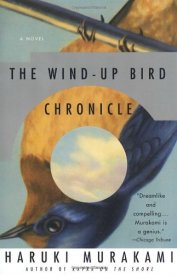novella
Active Member
Let's see if I can adequately opine on The Wind-Up Bird Chronicle without spoiling anything . . .
I think there are different ways to read Murakami's books. I've also read A Wild Sheep Chase and some of his short stories, so my experience is based on those as well. Some read his work as allegorical, some as surreal, some as an odd branch of the mystery genre. I think of his works as unfolding the way dreams do.
Dreams are made by experience and desire filtered and mixed through fantasy and emotion. Things and characters and events are invented to fill the gaps presented by all these elements swirling together. In your dreams you don't know where you are going or why. This is how I feel as I read a Murakami novel.
I am of the opinion that any author's intent is irrelevant; the experience of reading is between the written word and the reader, no more and no less. I only say this because I think questions of Murakami's intent are not germane.
Why discuss these issues vis a vis Murakami's work but not other authors' works? I think its because of what his books are not: they do not have conventional plots, they do not follow conventional rules about introducing useless characters, they do not have clear social commentaries, they are not 'Japanese' in the traditional sense, yet they are not unJapanese. They combine mysticism, ennui, fate, good and evil, tropes of the great heroic legends, pedestrian references to things and clothing, and a lack of explication that can be either frustrating or intriguing, depending on the reader's (my) mood.
I find myself asking, What does this mean? What does that mean? Why are there passages of painful reality interspersed with passages of supernatural heroism (in the mythological sense)? And I don't know the answers. But I'll continue to read his work, enjoy it as it takes me along in its flow, while I continue to wonder what he's up to.
I could have put this in the Haruki Murakami thread that exists, but instead I'll just provide a link to that for those interested. This link puts you at the most recent post in that thread.
http://forums.thebookforum.com/showthread.php?t=5015
Also, for anyone who goes to this thread and reads my review there of A Wild Sheep Chase (and the conversation with jay that ensued), I can say for certain that Wind-Up Bird Chronicle does not share the airless, flat emotional landscape of Sheep Chase, and that several other of my criticisms of that book are not true for Wind-Up Bird. Um, for those interested . . .
I think there are different ways to read Murakami's books. I've also read A Wild Sheep Chase and some of his short stories, so my experience is based on those as well. Some read his work as allegorical, some as surreal, some as an odd branch of the mystery genre. I think of his works as unfolding the way dreams do.
Dreams are made by experience and desire filtered and mixed through fantasy and emotion. Things and characters and events are invented to fill the gaps presented by all these elements swirling together. In your dreams you don't know where you are going or why. This is how I feel as I read a Murakami novel.
I am of the opinion that any author's intent is irrelevant; the experience of reading is between the written word and the reader, no more and no less. I only say this because I think questions of Murakami's intent are not germane.
Why discuss these issues vis a vis Murakami's work but not other authors' works? I think its because of what his books are not: they do not have conventional plots, they do not follow conventional rules about introducing useless characters, they do not have clear social commentaries, they are not 'Japanese' in the traditional sense, yet they are not unJapanese. They combine mysticism, ennui, fate, good and evil, tropes of the great heroic legends, pedestrian references to things and clothing, and a lack of explication that can be either frustrating or intriguing, depending on the reader's (my) mood.
I find myself asking, What does this mean? What does that mean? Why are there passages of painful reality interspersed with passages of supernatural heroism (in the mythological sense)? And I don't know the answers. But I'll continue to read his work, enjoy it as it takes me along in its flow, while I continue to wonder what he's up to.
I could have put this in the Haruki Murakami thread that exists, but instead I'll just provide a link to that for those interested. This link puts you at the most recent post in that thread.
http://forums.thebookforum.com/showthread.php?t=5015
Also, for anyone who goes to this thread and reads my review there of A Wild Sheep Chase (and the conversation with jay that ensued), I can say for certain that Wind-Up Bird Chronicle does not share the airless, flat emotional landscape of Sheep Chase, and that several other of my criticisms of that book are not true for Wind-Up Bird. Um, for those interested . . .



